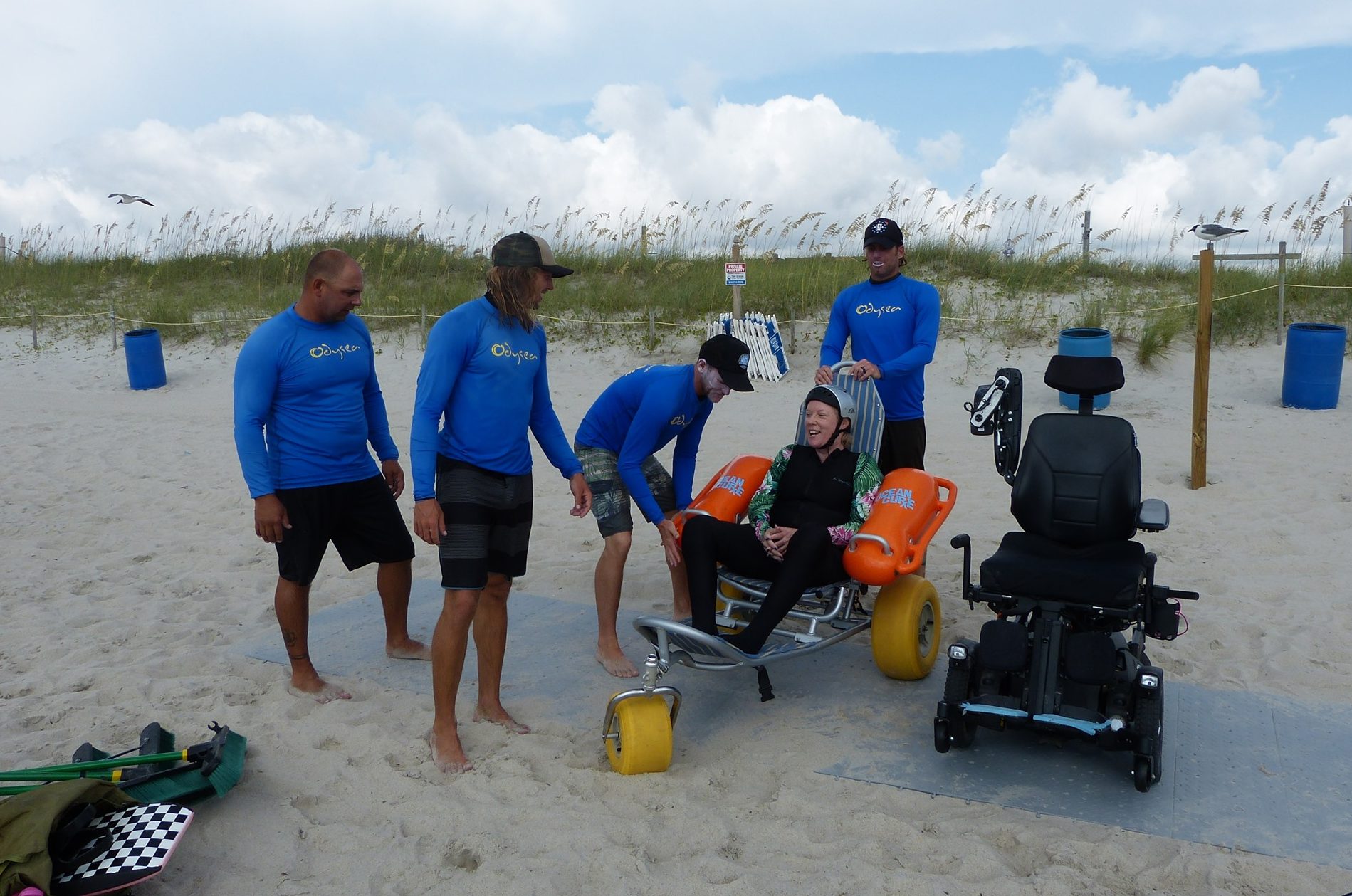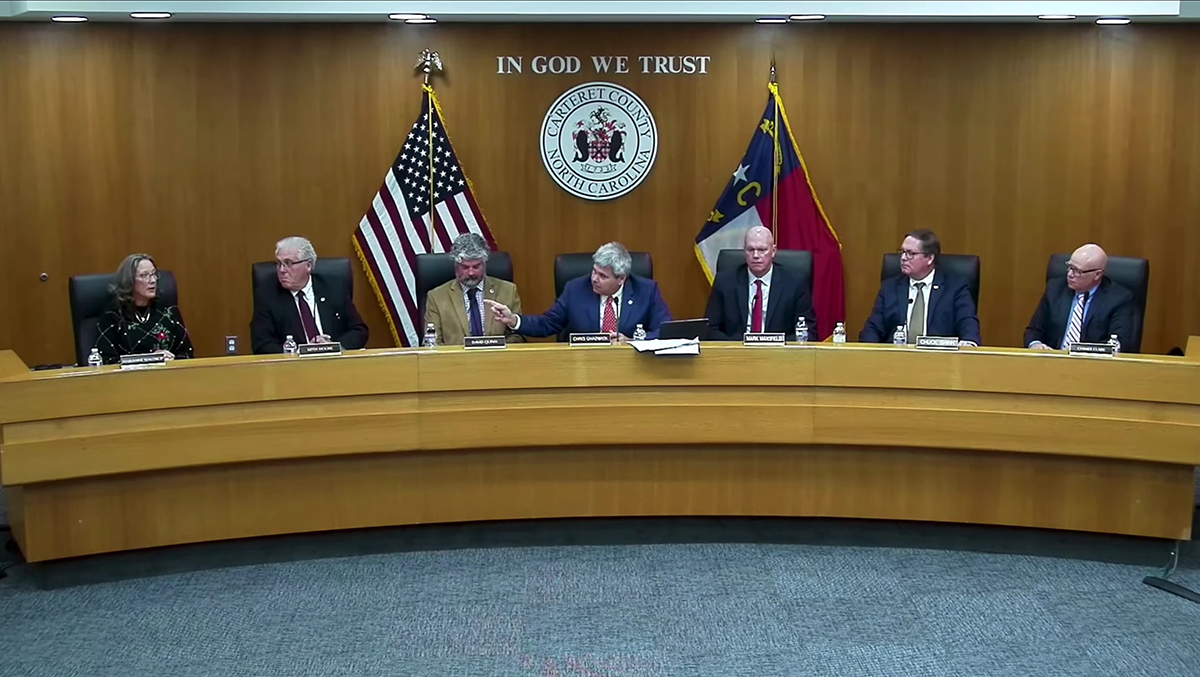
Wheelchair users will continue to get front-row access to a stretch of Carolina Beach’s ocean shoreline this coming summer.
The North Carolina Coastal Resources Commission on Thursday granted the New Hanover County town a variance allowing the seasonal installation of beach mats to create a nearly 3,000-foot-long hard surface atop dry sand beach.
Supporter Spotlight
The commission’s unanimous decision during its virtual meeting ends more than a year of wrangling between state agencies and the town, which last October was denied a state permit to have the mats installed.
“I felt like popping a bottle of champagne,” Carolina Beach Parks and Recreation Director Eric Jelinski said of the vote to approve.
The mats were initially installed with the town’s approval in spring 2017 by Ocean Cure, a Carolina Beach-based nonprofit organization that offers surfing programs to people with disabilities to give people in wheelchairs independent access to the beach.
“We were the first ones to kind of go against the grain and extend (access) down to just above the high tide line,” said Kevin Murphy, Ocean Cure’s founder. “The whole point is to allow some independence. That’s really what we were striving for.”
One large mat, created by a series of light gray-colored, hard plastic mats that link together, is connected to the town’s boardwalk in Carolina Beach’s central business district, where two oceanfront hotels, restaurants and shops pepper the popular ocean strand.
Supporter Spotlight
To someone in a wheelchair, the mat allows freedom to spend time on the beach without having to rely on others for help.
“Realizing that they can now get to the beach and get back up to the boardwalk and use the restrooms, go eat at a restaurant, go to the shops, that’s huge,” Murphy said.
What he and town leaders did not know that first summer the mats were installed was that, under state rules, the mats are considered a structure and thus require a Coastal Area Management Act, or CAMA, permit.
Ocean Cure reinstalled the mats for the 2018 summer season, which runs Memorial Day weekend at the end of May through to Labor Day weekend in early September, and the group reinstalled them again in 2019.
On May 9, 2019, the state Division of Coastal Management, or DCM, and North Carolina Wildlife Resources Commission notified the town that the mats would have to be removed from the beach each night to avoid potential harm to nesting sea turtles. Turtle nesting season runs mid-May through August.
The mats were not removed.
The following year, in July 2020, the division issued an enforcement letter to the town, explaining that the beach mats were “development” within an ocean hazard area of environmental concern, or AEC.
Ocean hazard AECs are defined by the state as areas where a substantial possibility of excessive erosion and significant shoreline fluctuation exists. The average erosion rate for the site on which the beach mats are placed is 2 feet per year.
In the CAMA minor permit application that Carolina Beach submitted to the Division of Coastal Management last September, the town requested the mats remain in place between May and September.
The president of the Pleasure Island Sea Turtle Project, a nonprofit organization whose volunteers monitor sea turtle nests in Carolina Beach, said in an affidavit that in 15 years, two nests have been laid where the mats were placed and that none had been laid since the Hampton Inn was built in 2016.
The commission’s variance does not restrict the time frame in which the beach mats may stay on the shore, as proposed in the town’s CAMA permit application, just in case the town decides to use the mats beyond that time frame. The town will still have to receive a permit modification if it chooses to go that route.
The town’s parks and recreation department has 10 beach wheelchairs, most of which were funded by Island Women, another Pleasure Island nonprofit organization.
The wheelchairs are available to the public at no cost and can be reserved by emailing reccenter@carolinabeach.org or calling 910-458-2977.
“Those wheelchairs can be checked out any time of the year, but during the summer season, they’re heavily used,” Jelinski said. “We do allow folks to reserve a beach wheelchair for up to a week at a time. Usually it’ll be returned on a Saturday morning and turned around and sent back out again.”
His department has already received calls for reservations for the upcoming season.
Beach wheelchairs are larger than regular wheelchairs. They require transport in “sizable” vehicles, Murphy said. And, they’re not particularly easy to push on the beach.
Murphy said he has received more than 100 letters from people who have used the beach mat in Carolina Beach.
“I know it’s used constantly,” he said.
He lauded state officials for their role in ensuring the future of the beach mats.
“We were a little upset when we were told we had to pull it up,” Murphy said. “(The division) really wanted to listen to what we have done. They advocated for us. It really was a team effort.”
Division Director Braxton Davis said the stories people shared with him through emails and letters about the beach mats “moved me personally to advocate for these issues.”
“I think it’s a stellar example and I appreciate everyone going through this process,” he said.
Commission Chairwoman Renee Cahoon applauded the town’s efforts to provide beach accessibility to those with disabilities.
“I think more these are going to come forward,” she said. “It’s a component of family vacation for everybody in the family to be able to enjoy their beach vacation.”







